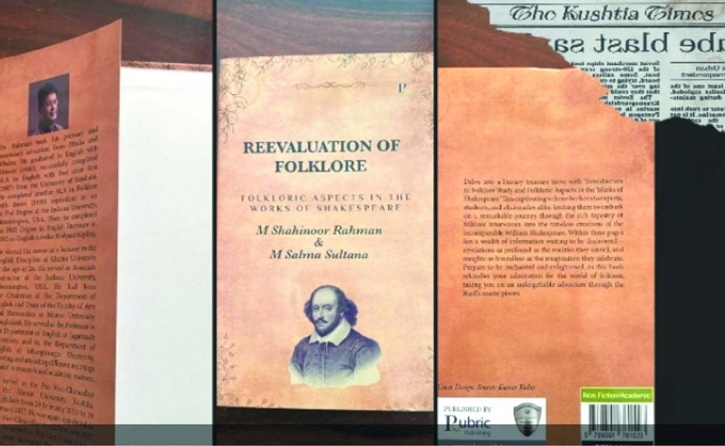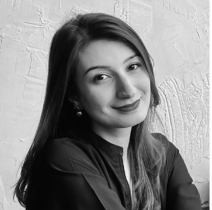
The intellectual prowess and unwavering commitment of Professor Dr. M. Shahinoor Rahman and Professor Dr. M. Salma Sultana shine in their joint research on Reevaluation of Folklore: Folkloric Aspects in the Works of Shakespeare. Amidst many scholarly investigations, their research stands out as a beacon of profound comprehension, offering readers a captivating exploration of the intricate relationship between folklore and Shakespearean literature.
The particular concentration on detailed and unwavering commitment to academic rigour demonstrated by Dr. Rahman and Dr. Sultana is palpable in their examination of Shakespeare's creative domain, renowned for its multifaceted nature. They deftly unravel the various elements of folklore intricately woven throughout the literary composition, illuminating their profound and significant nature. Through their insightful study, they illuminate the lyrical portrayal of folklore in Shakespeare's plays, transcending the constraints of time and culture to access the fundamental elements of human existence.
Moreover, Dr. Rahman and Dr. Sultana's scholarly analysis of the cultural milieu that influenced Shakespeare's viewpoint offers a captivating avenue for exploring the complex tapestry of outdated customs, superstitious convictions, and persistent myths. The thorough dissection of Shakespeare's plays elicits a deep sense of awe and investigation as each backdrop reverberates with the existence of distinguished individuals and compelling domains.
Rahman and Sultana's research not only deepens our understanding of Shakespeare's literary heritage but also underscores the enduring significance of folklore as a repository of human knowledge and shared memories. They guide readers on an intellectual journey that resonates with the fundamental aspects of the human experience, leveraging their profound understanding and unwavering commitment to scholarly inquiry.
Reevaluation of Folklore acknowledges and respects Rahman and Sultana's outstanding academic investigation. This work can stimulate forthcoming cohorts of readers and scholars to further explore the complex fabric of human creativity and imagination. Their collaborative effort enhances the discourse on Shakespearean studies, promoting increased consciousness and comprehension.
M. Shahinoor Rahman and M. Salma Sultana's scholarly contributions are highly commendable. Through their extensive knowledge and meticulous scholarly investigation, these academics have illuminated the intricate correlation between folklore and literature, unveiling the substantial influence of both interrelated realms of Shakespeare's enduring literary works.
Dr. Rahman and Dr. Sultana's work clearly displays their unwavering dedication to examining the complex concepts and characters in Shakespeare's plays, which deeply connect with the cultural heritage and universal truths. The authors skillfully analyze the relevant historical events and the enduring influence of human creativity, creating a connection between the past and present.
Furthermore, Rahman and Sultana's examination delves into significant subjects such as love, treachery, and justice, firmly grounded in folklore and Shakespearean literature. This scholarly endeavour enhances our comprehension of the human condition and the stories that have influenced our shared awareness throughout history. The writers' comprehensive examination of Shakespeare's artistic choices, shaped by the prevailing oral traditions of his day, provides a valuable understanding of the complex web of folkloric components that enhance the profundity and significance of his literary creations.
The scholarly work conducted and accomplished by Dr. Rahman and Dr. Sultana demonstrates a high level of quality. It provides insights into the lasting impact of storytelling and the complex interplay between tradition and innovation. Their thorough examination motivates readers to embark on a profound exploration, surpassing the limitations of time and space to reveal the timeless truths fundamental to Shakespeare's works.
In Reevaluation of Folklore: Folkloric Aspects in the Works of Shakespeare, the authors exhibit a notable proficiency in traversing the intricate landscape of literary analysis. They skillfully explicate the substantial influence of folklore on Shakespeare's narrative tactics, offering a valuable understanding of the complicated dynamics of narrative structures that mould his literary works. Employing their meticulous examination, the authors reveal the Bard's cerebral acumen, showcasing his remarkable aptitude for encapsulating the essential essence of human encounters and sentiments.
In addition, the authors' commitment to exploring the mutually beneficial relationship between folklore and Shakespearean literature highlights their deep comprehension of both topics. Their work showcases the lasting impact of storytelling, surpassing temporal and cultural limitations to bring together readers in a shared admiration for the ageless concepts found in Shakespeare's classics.
Finally, the authors' methodical investigation enhances our understanding of Shakespeare's remarkable artistic skills while underlining the enduring importance of folklore in modern culture. The comprehensive analysis provided by the authors enables readers to engage in a captivating journey of investigation, wherein remnants of the historical events intersect with the enduring allure of Shakespeare's literary works, culminating in a complex fabric of deep comprehension and inspiration. I express my profound appreciation to Professor Rahman and Professor Sultana for their great endeavours in creating a sophisticated and insightful analysis of Shakespeare's masterpieces.
Reviewer is Professor Dr. M. Maniruzzaman, Professor, Department of English, Jahangirnagar University, Savar, Dhaka, Bangladesh. He is an applied linguist, researcher, ELT practitioner, writer, and columnist.





































